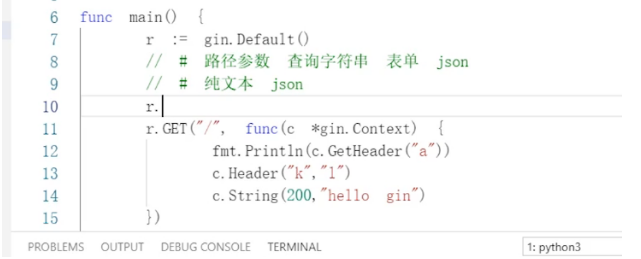gin框架获取参数
目录
获取header头里的参数:
scene := httpext.GetHeaderByName(ctx, "scene") // online / dev
// @desc 通过上下文获取header中指定key的内容
func GetHeaderByName(ctx *gin.Context, key string) string {
return ctx.Request.Header.Get(key)
}
//获取用户微信信息表里的数据
body, _ := ctx.Get("json")
us.UserWxModel.WxUserInfo = service.BuildNick(body.(string)) /*编码特殊特号*/
httpext包
package httpext
import (
"fmt"
"github.com/gin-gonic/gin"
"io/ioutil"
"linkbook.com/LinkBookGo/lib/apilog"
)
// @desc 通过上下文获取header中指定key的内容
func GetHeaderByName(ctx *gin.Context, key string) string {
return ctx.Request.Header.Get(key)
}
// @desc 通过上下文获取body内容并将内容写到指定key中
func SetBodyJson(context *gin.Context, key string) {
body, _ := ioutil.ReadAll(context.Request.Body)
apilog.DebugLog("当前请求数据内容:", string(body[:]))
fmt.Println("当前请求的数据:", string(body[:]))
context.Set(key, string(body[:]))
}
方法二:
~~~
//获取body里的数据
func getBodyData(c *server.Context) string {
var bodyBytes []byte
if c.Request.Body != nil {
bodyBytes, _ = ioutil.ReadAll(c.Request.Body)
}
// 把刚刚读出来的再写进去
c.Request.Body = ioutil.NopCloser(bytes.NewBuffer(bodyBytes))
return string(bodyBytes)
}
~~~
https://www.bilibili.com/video/av68769981/?p=2
课程代码:
https://www.qfgolang.com/?special=ginkuangjia&pid=2783
https://www.liwenzhou.com/posts/Go/Gin_framework/
package main
import (
"bytes"
"encoding/json"
"fmt"
"log"
"strconv"
"github.com/gin-gonic/gin"
)
func main() {
engine := gin.Default()
// GET请求 Query / DefaultQuery 单个接收get参数
//http://localhost:8080/hello?name=haima
engine.GET("/hello", func(context *gin.Context) {
fmt.Println(context.FullPath())
//获取字符串参数
username := context.Query("name") //方法一
fmt.Println(username)
//name := context.DefaultQuery("name", "") //方法二
//fmt.Println(name)
context.Writer.Write([]byte("Hello," + username)) //Hello,go
})
type Student struct {
Name string `form:"name"`
Classes string `form:"classes"`
}
// GET请求 ShouldBindQuery 批量接收get参数
// http://localhost:8080/hello2?name=davie&classes=软件工程
engine.GET("/hello2", func(context *gin.Context) {
fmt.Println(context.FullPath())
var student Student
err := context.ShouldBindQuery(&student)
if err != nil {
log.Fatal(err.Error())
}
fmt.Println(student.Name) //davie
fmt.Println(student.Classes) //软件工程
context.Writer.Write([]byte("hello," + student.Name))
})
type Register struct {
UserName string `form:"name"`
Phone string `form:"phone"`
Password string `form:"pwd"`
}
//http://localhost:8080/login
//单个接收post过来的参数
engine.POST("/login", func(context *gin.Context) {
fmt.Println(context.FullPath()) // /login
username := context.PostForm("username") //方法一
//username, exist := context.GetPostForm("username") //方法二
userId, _ := strconv.ParseInt(context.Query("user_id"), 10, 64)
//if !exist {
// fmt.Println(username) //adf
//}
//password := context.PostForm("pwd")
password, exists := context.GetPostForm("pwd") //12323
//password:= com.StrTo(context.GetPostForm("pwd")).MustInt()
if !exists {
fmt.Println(password) //12323
}
fmt.Printf("%T %s\n", username,username) //string adf
fmt.Printf("%T %d\n", userId,userId) //int64 0
fmt.Printf("%T %s\n", password,password) //string 12323
context.Writer.Write([]byte("Hello " + username + ", pwd:" + password)) //Hello go, pwd:123
})
//http://localhost:8080/register
// ShouldBind 批量接收post数据 application/x-www-form-urlencoded方式
engine.POST("/register", func(context *gin.Context) {
fmt.Println(context.FullPath())
var register Register
if err := context.ShouldBind(®ister); err != nil {
log.Fatal(err.Error())
return
}
fmt.Println(register.UserName)
fmt.Println(register.Phone)
context.Writer.Write([]byte(register.UserName + " Register "))
})
// POST multipart/form-data 方式
formData,err:=c.MultipartForm()
fmt.Println("++MultipartForm++",formData,err)
for k,v :=range formData.Value{
fmt.Println("k---->",k) #k----> name k----> age
fmt.Println("v---->",v[0]) #v----> haima v----> 30
}
// BindJSON 批量接收 post raw json 数据 方法一
//http://localhost:8080/testpost
//{
// "user_id": 1,
// "linkbook_id": "001",
// "type":"education",
// "id": 2
//}
engine.POST("/testpost", func(ctx *gin.Context) {
fmt.Println(ctx.FullPath())
type delInfo struct {
UserID int `from:"user_id"`
LinkbookID string `from:"linkbook_id"`
Type string `from:"type"`
ID int `from:"id"`
}
var delInfoParam delInfo
if err := ctx.BindJSON(&delInfoParam); err != nil {
log.Fatal(err.Error())
return
}
ctx.Writer.Write([]byte("Hello," + delInfoParam.Type)) //Hello,go
})
// BindJSON 批量接收 post raw json 数据 方法二
//http://localhost:8080/test
engine.POST("/test", func(context *gin.Context) {
fullPath := "请求路径:" + context.FullPath()
fmt.Println(fullPath)
SetBodyJson(context, "json")
var delInfo map[string]interface{}
err := getRequestBody(context, &delInfo)
fmt.Println(err)
fmt.Println(delInfo)
})
//http://localhost:8080/user/22
engine.DELETE("/user/:id", DeleteHandle)
engine.Run(":8090")
}
//http://localhost:8080/user/adf
func DeleteHandle(context *gin.Context) {
fmt.Println(context.FullPath()) // /user/:id
userID := context.Param("id")
fmt.Println(userID) //adf
context.Writer.Write([]byte("Delete user's id : " + userID)) //Delete user's id : adf
}
func getRequestBody(context *gin.Context, s interface{}) error {
body, _ := context.Get("json")
reqBody, _ := body.(string)
decoder := json.NewDecoder(bytes.NewReader([]byte(reqBody)))
decoder.UseNumber()
err := decoder.Decode(&s)
return err
}
// @desc 通过上下文获取body内容并将内容写到指定key中
func SetBodyJson(context *gin.Context, key string) {
body := make([]byte, 1048576)
n, _ := context.Request.Body.Read(body)
fmt.Println("request body:", n)
context.Set(key, string(body[0:n]))
}
//type People interface {
// name()
//}
//
//type Wang struct {
// Name string
//}
//
//func (p *Wang) name() {
// p.Name = "wang"
//}
//
//func (p *Wang) sayMyName() {
// fmt.Println(p.Name)
//}
context.Param获取请求参数
客户端的请求接口是DELETE类型,请求url为:http://localhost:9000/user/1。
最后的1是要删除的用户的id,是一个变量。因此在服务端gin中,
通过路由的:id来定义一个要删除用户的id变量值,
同时使用context.Param进行获取

[Haima的博客]
http://www.cnblogs.com/haima/



【推荐】国内首个AI IDE,深度理解中文开发场景,立即下载体验Trae
【推荐】编程新体验,更懂你的AI,立即体验豆包MarsCode编程助手
【推荐】抖音旗下AI助手豆包,你的智能百科全书,全免费不限次数
【推荐】轻量又高性能的 SSH 工具 IShell:AI 加持,快人一步
· 10年+ .NET Coder 心语,封装的思维:从隐藏、稳定开始理解其本质意义
· .NET Core 中如何实现缓存的预热?
· 从 HTTP 原因短语缺失研究 HTTP/2 和 HTTP/3 的设计差异
· AI与.NET技术实操系列:向量存储与相似性搜索在 .NET 中的实现
· 基于Microsoft.Extensions.AI核心库实现RAG应用
· TypeScript + Deepseek 打造卜卦网站:技术与玄学的结合
· 阿里巴巴 QwQ-32B真的超越了 DeepSeek R-1吗?
· 【译】Visual Studio 中新的强大生产力特性
· 10年+ .NET Coder 心语 ── 封装的思维:从隐藏、稳定开始理解其本质意义
· 【设计模式】告别冗长if-else语句:使用策略模式优化代码结构
2020-01-27 解决go get下载包失败问题
2020-01-27 LogAgen的工作流程